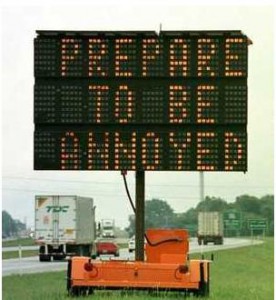 I’m reading Lynne Tillman’s Someday This Will Be Funny, and I’m annoyed. At first, I don’t know that I’m annoyed — it starts as a vague gnawing feeling in my frontal lobe — but before long, I greet the familiar sentiment with a sigh. Hello irritation.
I’m reading Lynne Tillman’s Someday This Will Be Funny, and I’m annoyed. At first, I don’t know that I’m annoyed — it starts as a vague gnawing feeling in my frontal lobe — but before long, I greet the familiar sentiment with a sigh. Hello irritation.
I’ve been thinking about annoyance a lot lately, because it seems to me that I get annoyed with a novel more easily than many readers I know. Maybe they’re willing to forgive more, allow more to be redeemed, in a novel they’re enjoying. For me, anything can do it, and once that switch is flipped, finishing the book becomes an exercise in emotional temperance.
There’s a new book called, Annoying: The Science of What Bugs Us, and while I’m not that interested in reading a whole treatise on it, I’ve been intrigued enough by the topic to flip through the book several times. Things that are annoying to most people include: loud cell phone talkers, flies, nails on a chalkboard, car alarms, and, seemingly above all else, rude people.
When I turn that idea over in my head, and ask myself why we find rude people so annoying, I imagine the answer must have something to do with the fact that, as members of the same species, we’re all expected to adhere to the same baseline of public etiquette, so that we can tolerate to share space with each other. When someone else isn’t holding up their end of the bargain (showing up late, or taking a call during lunch, or chewing gum loudly), we resent them. If we’re doing our part, they should have to do theirs.
Now, I know we can’t equate art with life, and of course, there’s no accounting for taste, but I get annoyed in the same way when reading something that strikes me as rude. If I’m putting in the time and energy to read your novel, to consider you, you should have considered me when writing it.
There are myriad ways to annoy a reader (this reader, at least), but here are some examples, along with corresponding books I’ve recently been annoyed by.
The self-indulgent: when the novel reads like a personal journal of the author’s obsessions and fetishes. Personal offender: Charles Yu’s How to Live Safely In A Science Fictional Universe.
The pretentious or haughty: when the author’s tone reads like a Good Writing contest, but neither the story nor the characters justify this affectation. Or, when the scope of the novel seems too lofty for the author to handle. Personal offender: Peter Carey’s Parrot and Olivier in America.
The grating: when both the author and characters voices are endlessly aggravating, self-important, asinine, most often under the guise of “humor.” Personal Offenders: Mordecai Richler’s Barney’s Version, Tim O’Brien’s Tomcat In Love.
The poorly written: in the most basic sense – tons of metaphor, sentences that don’t mean anything, bad dialogue, adhering to tired tropes…Personal Offenders: I try not to read these books, but I think it’s fair to say there are whole genres that fit into this category, with only a few shining standouts within each (think Chick-Lit, Romance, Fantasy). I think it’s equally fair to say, however, that the standouts from these genres are some of the best writers out there. Jennifer Belle comes to mind.
The self-conscious: when you can tell that the author has read each line aloud, trillions of times, while looking at themselves in the mirror, to make sure that they have the effect that’s hoped for. Or simply, when the prose is too poetic to serve the story. Personal Offenders: Rebecca Wolff’s The Beginners.
The pointless: when you couldn’t care less what happens, or when the author doesn’t care enough to invest time and energy into their characters, or when characters are used as pawns to further the author’s muddled philosophies. Personal Offenders: Lynne Tillman’s Someday This Will Be Funny.
I sent out an email yesterday, asking a few people what they found annoying in books. A novelist friend of mine said that her own indifference was the most common reason for her to abandon a novel, and then, as if to demonstrate precisely how different our tastes can be, she cited Jennifer Egan’s The Keep: a novel I loved. She also said she’s been reading a lot of contemporary literary fiction that seems, “too self-consciously troubled and dark,” which is what I was trying to say about Wolff’s The Beginners.
Another friend told me he abandoned Jonathan Franzen’s Freedom because he found the “awfulness” of one of the characters to be annoying. Another novel I loved.
This happened all day: people I know and whose intellect I trust and admire told me they were annoyed by books I love, and love books that annoy me. I suppose that outside of those few universally offensive behaviors (the guy texting in the theater, the shrill laugher in the restaurant), we’re all case studies in the science of irritation, and nowhere is that more clear than in our reading tastes.
(ed. note: In keeping with Morgan’s last point, I quite enjoyed a number of the books that annoyed her (esp. Parrot and Olivier and The Beginners). I also think Tillman’s Someday This Will Be Funny is one of the best of the year. C’est la vie! — Alex)
This post may contain affiliate links.








